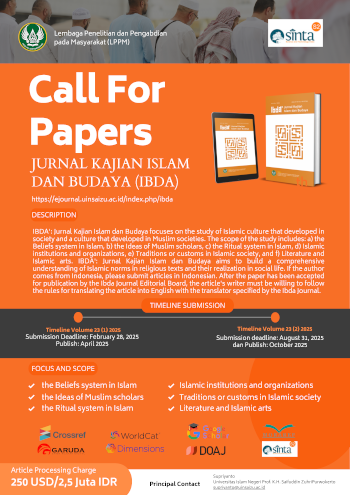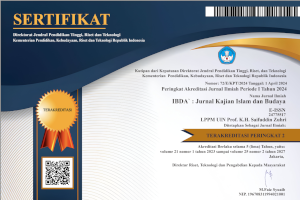The Philosophy Of Sunan Gunung Jati’s Petatah-Petitih: The Contributions To Kuwu Ethical Leadership In Cirebon Regency
DOI:
https://doi.org/10.24090/ibda.v19i2.4702Keywords:
Ethics, kuwu vilage chief, petatah-petitih, philosophy, Sunan Gunung DjatiAbstract
This study is focused on the philosophy of Sunan Gunung Jati's petatah-petitih (proverb) and the contribution to the Kuwu (leaders at the local government structure/ village chief) ethical leadership in Cirebon Regency. The material object of this study covers the philosophy of petatah-petitih written by Sunan Gunung Jati while the formal object is social philosophy concerning the local culture. This phenomenological study aims to uncover the insight of Sunan Gunung Jati's philosophy and social phenomena that explain the research problem. This study seeks to examine three things: (1) what is the philosophy of Sunan Gunung Jati's petatah-petitih?, (2) how is the ethical leadership of Sunan Gunung Jati?, and (3) What are the contributions of the philosophy of petatah-petitih to Kuwu ethical leadership in Cirebon Regency?. The findings of this study underline the strong influence of Sunan Gunung Jati's petatah-petitih to the leaders at the local government structure in Cirebon Regency. The moral values in the Sunan Gunung Jati's leadership system are implied in the petatah-petitih and leadership behaviors. The values of the petatah-petitih encompass noble teachings that must be possessed by a leader. The values are broadly categorized into four groups, namely the teachings on faith and devotion, teachings on wisdom, teachings on discipline, and teachings on manner and politeness. These four teachings can be grouped into philosophical ethics in the form of theistic ethics, personal ethics, and social ethics.Downloads
Download data is not yet available.
References
Efendi, Hasan, 1994, Petatah-Petitih Sunan Gunung Djati: Dari Aspek Nilai dan Pendidikan, Bandung: IndraPrahasta.
http://setda.cirebonkab.go.id/kabupaten-cirebon-masuk-peringkat-ke-4-sebagai-kabupaten-termiskin-di-jawa-barat.html, akses 8 Maret 2020
Jay, R.R., 1969, Javanese Villagere: Social Relation in Rural Modjokuto, Cambridge: M.I.T. Press.
Kartanegara, Satochid, 2002, Hukum Pidana Kumpulan Kuliah, Balai Lektur Mahasiswa.
Koentjaraningrat, 1994, Kebudayaan Mentalitas dan Pembangunan, Jakarta : Gramedia.
Nasr, Sayyed Hossein, 2003, The Heart of Islam : Enduring Values for Humanity, diterjemahkan oleh Nurasiah Fakih Sutan Harahap, The Heart of Islam :Pesan-Pesan Universal Islam untuk Kemanusiaan, Cet. I; Bandung : Mizan.
Nasution, Harun, 1985, Islam di Tinjau dari Berbagai Aspeknya, Jakarta : UI Press, 1985.
Notonagoro, 1995, Pancasila Secara Ilmiah Populer, Jakarta: Bumi Aksara.
Sulendraningrat, 1985, Sejarah Cirebon, Jakarta: Balai Pustaka.
Sunoto, 1985, Mengenal Pancasila Pendekatan Melalui Metafisika Logika Etika, Yogyakarta : PT Hanindita.
Suseno, Franz Magnis, 1998, Etika Dasar, Masalah-masalah Pokok Filsafat Moral, Jakarta: Kanasius.
Wildan, Dadan, 2003, Sunan Gunung Jati: Antara Fiksi dan Fakta, Bandung: Humaniora Utama Press
http://setda.cirebonkab.go.id/kabupaten-cirebon-masuk-peringkat-ke-4-sebagai-kabupaten-termiskin-di-jawa-barat.html, akses 8 Maret 2020
Jay, R.R., 1969, Javanese Villagere: Social Relation in Rural Modjokuto, Cambridge: M.I.T. Press.
Kartanegara, Satochid, 2002, Hukum Pidana Kumpulan Kuliah, Balai Lektur Mahasiswa.
Koentjaraningrat, 1994, Kebudayaan Mentalitas dan Pembangunan, Jakarta : Gramedia.
Nasr, Sayyed Hossein, 2003, The Heart of Islam : Enduring Values for Humanity, diterjemahkan oleh Nurasiah Fakih Sutan Harahap, The Heart of Islam :Pesan-Pesan Universal Islam untuk Kemanusiaan, Cet. I; Bandung : Mizan.
Nasution, Harun, 1985, Islam di Tinjau dari Berbagai Aspeknya, Jakarta : UI Press, 1985.
Notonagoro, 1995, Pancasila Secara Ilmiah Populer, Jakarta: Bumi Aksara.
Sulendraningrat, 1985, Sejarah Cirebon, Jakarta: Balai Pustaka.
Sunoto, 1985, Mengenal Pancasila Pendekatan Melalui Metafisika Logika Etika, Yogyakarta : PT Hanindita.
Suseno, Franz Magnis, 1998, Etika Dasar, Masalah-masalah Pokok Filsafat Moral, Jakarta: Kanasius.
Wildan, Dadan, 2003, Sunan Gunung Jati: Antara Fiksi dan Fakta, Bandung: Humaniora Utama Press
Downloads
Published
2021-09-30
How to Cite
Subhan, S., & Sururi, A. (2021). The Philosophy Of Sunan Gunung Jati’s Petatah-Petitih: The Contributions To Kuwu Ethical Leadership In Cirebon Regency. IBDA` : Jurnal Kajian Islam Dan Budaya, 19(2), 383–397. https://doi.org/10.24090/ibda.v19i2.4702
Issue
Section
Articles
License
Authors who publish with this journal agree to the following terms:
- Authors retain copyright and grant the journal right of first publication with the work simultaneously licensed under a Creative Commons Attribution-ShareAlike License a that allows others to share the work with an acknowledgement of the work's authorship and initial publication in this journal.
- Authors are able to enter into separate, additional contractual arrangements for the non-exclusive distribution of the journal's published version of the work (e.g., post it to an institutional repository or publish it in a book), with an acknowledgment of its initial publication in this journal.
- Authors are permitted and encouraged to post their work online (e.g., in institutional repositories or on their website) before and during the submission process, as it can lead to productive exchanges, as well as earlier and greater citation of published work (See The Effect of Open Access).















